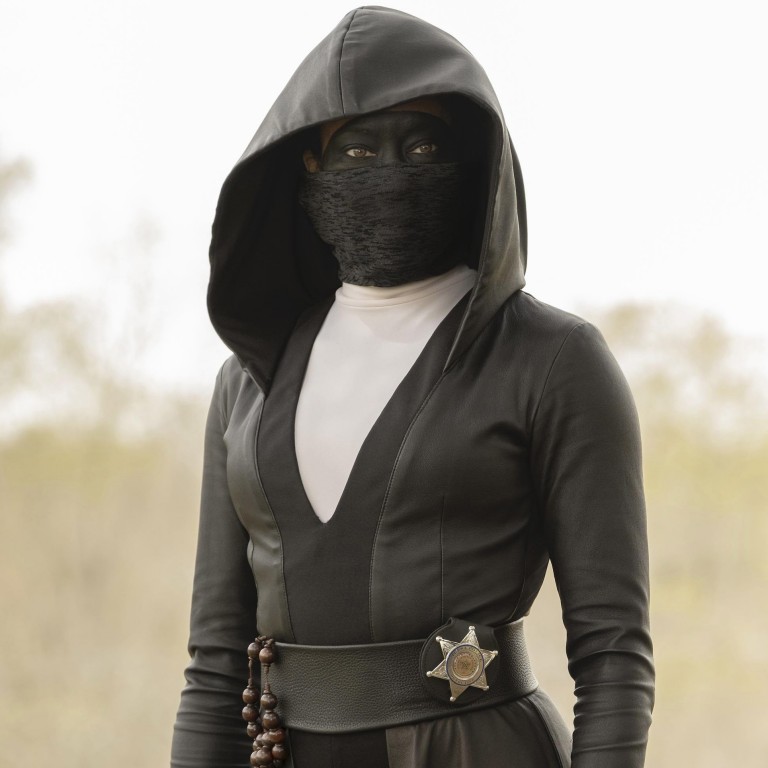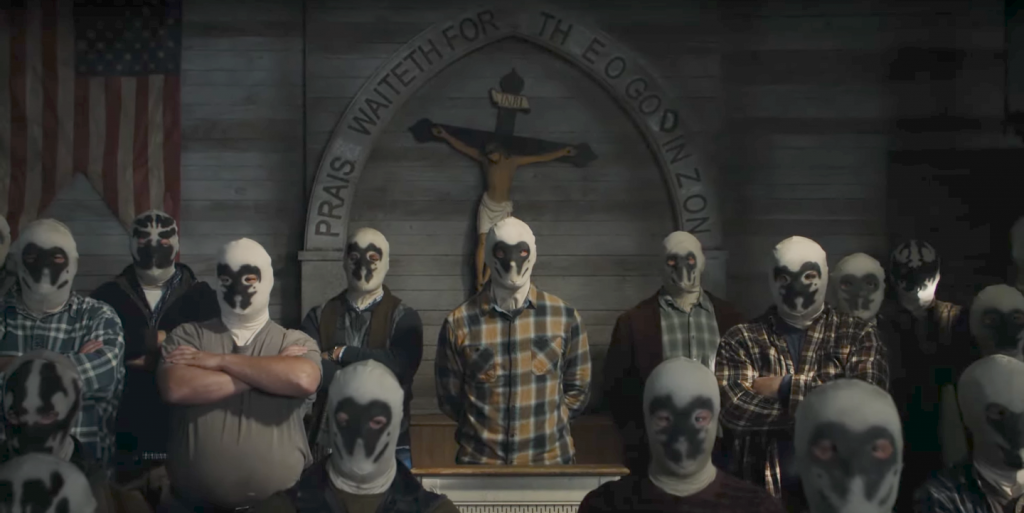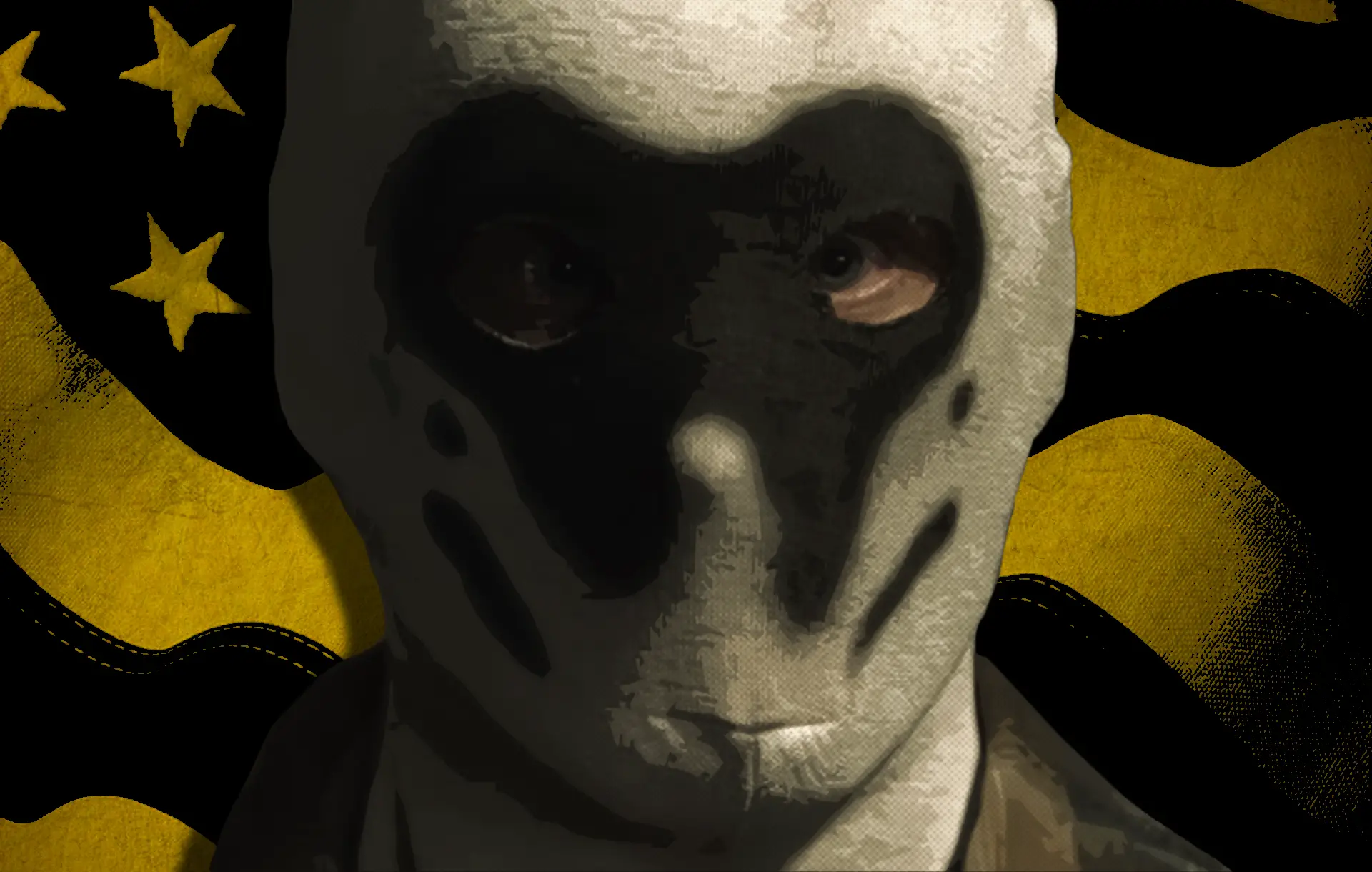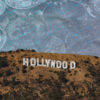* Slight Spoilers Ahead *
The masks in Alan Moore and Dave Gibbons’s “Watchmen” have always symbolized an idea or deeper meaning, crafted in order to mold to a new personality based on an alter-ego. Rorschach’s mask resembles the black ink blotches from the eponymous test upon which the character bases his name. It’s a symbol for the black and white moral constructs through which he views society. It is no different in HBO’s Watchmen, masterfully crafted by Damon Lindelof (LOST).

The introduction to the series almost unfolds like a non-satirical reverse version of D.W. Griffith’s The Birth of a Nation. Instead of depicting freed Black slaves rising to power as a perverted, racist “precautionary” tale, Watchmen portrays the Ku Klux Klan seemingly rising to power beginning with the Tulsa Race Riots (Black Wall Street Massacres), lying dormant in the public eye, staying active in the political realm, until present day, when a white supremacist group wearing Rorschach masks rose from the shadows to reign terror on the Tulsa police force, now the vigilantes are forced to wear masks (an allegory to the appropriation of identity and culture), and a connection to The Black Wall Street Massacres is uncovered through the series’s main character, Angela Abar (Regina King), who also, initially, confines the world through a black and white lens, as viewers learn during a particular conversation with her daughter in Episode 2. It is through her grandfather, Will Reeves, that Angela, and, viewers, learn that a moral grey area exists. Reeves has a very specific background, the son of a soldier who fought for the Germans in WWI, the hidden identity of the alter ego superhero depicted in “American Hero Story” (an example of revisionist history and historical cultural appropriation).
However, it isn’t that simple. No one group is in power. It isn’t, in fact, black and white. While many fans of the graphic novels may be outraged at the fact that Lindelof has “rebranded” Rorschach, it’s an allegory for the kind of appropriation that has repeatedly occurred in our society throughout history, particularly in the United States.
A History of Appropriation
I spoke with King after HBO’s San Francisco Watchmen premiere about the Rorschach mask and the theme of appropriation throughout the series: “I know that so many people who have decided that they wanted to cast their judgment, now, who are true graphic novel fans, have said, ‘Rorschach has nothing to do with what the original story was.’ King told me. “But it’s appropriation. In the spirit of an Alan Moore and Dave Gibbons Watchmen, that is the breaking the rules that should happen and the influence that would take place, the appropriation that took place with this character or this person that existed in that universe that is a true history to that world. In that world, we’re taking the Seventh Cavalry, who is using Rorschach as their face to appropriate something hateful. We can really liken that to so many forms of appropriation that take place within our own society now, holding a mirror up to it.”
Rorschach is long-dead in this timeline, his “manifesto“ published, and, like any influential text, has been misinterpreted to fit a particular group’s set of beliefs or cause.
Indeed, religious texts used to wage wars, offensive cultural appropriation, alt-right extremist groups using an antihero symbol like The Punisher’s as their own. Sounds familiar. Rorschach is long-dead in this timeline, his “manifesto“ published, and, like any influential text, has been misinterpreted to fit a particular group’s set of beliefs or cause. An extremist hate group. They relate to the figurative and literal black and white way in which he lived. Further, at first, it appears Black people and other minorities make up the majority of the police force. It has the potential to provoke a contentious reaction with both white and Black audiences, but the subject matter is approached with tact, Lindelof layering complexities beneath the facade of what appears to be unfolding on screen.
At the premiere general Q&A, King referenced Lindelof’s efforts to do justice to both the historical events depicted in the series and the controversial subject matter:
“Once I was in, and I was in because of my experience with Damon on The Leftovers, he made sure he had Black women as writers,” King said. “And he was very smart, and I feel responsible in making sure that he did that because for a lot of Black people who are just only seeing the first episode like, ‘What the fuck? What are you trying to say about police?’ It feels offensive for some. And some white people are like, ‘Are you trying to say Black people were in charge?’ No, nobody is the fuck in charge.”
Just as fringe white supremacist groups aren’t in power in the real world, they aren’t in power in the show; rather, there is somebody, some entity, more powerful, behind-the-scenes, pulling the proverbial strings, supposedly constructing this entire plan (enter Will Reeves and Lady Trieu). But are they truly the ones running the proverbial show, so to speak? If we’re to believe King, we shouldn’t believe anything that Lindelof presents as truth until it is indisputably confirmed. What, exactly, is the message Reeves and Trieu want to send? How are they associated with the Seventh Cavalry? I have it on solid authority that everything we think we know will be uprooted after the introduction of Lady Trieu.
“If you just really look at the mirror that’s being held up within this alternate history that reflects what’s happening right now, we’ve got to make some drastic moves that don’t really lean especially left or right. I want grandkids. I don’t know about y’all.” King continued. Essentially, the point she, and Lindelof are making regarding Watchmen is that it deconstructs the direness of the state of both the health of our planet and the diminishing harmony among humanity.

We All Wear Masks
In speaking about masks as a universally relatable entry point for all viewers, King said:
“I was so excited that this was through the eyes of a Black woman. This is the entry point for the audience. It’s through her POV that we see this world. When I read the pilot, I felt like it was very important to define what is that thing that is a connective tissue for all people, not just Black people. And the thing that I found was the mask. What is that thing that we all can relate to no matter what our past experiences have been? If there’s that one thing that we can relate to, then perhaps we can get to a space of maybe we don’t have the same experience but we can understand the pain or understand that there is pain or understand that there is guilt or understand that there is shame or understand that there is a need to hold onto something regardless of if it is negative to you or positive to you, but can understand the need to do that because that feels like comfort.”
Every human being on this planet has had to learn to adapt. To mask their pain in some form or another. Some people suffer from wounds that cut deep, feel fresh, are created relatively recently. Some people carry generational scars, the pain compounding the more it is masked.
“When we meet Angela, the woman that we meet is not the woman that we see when she’s at home. It’s not the woman that we see when she’s in the police department. And that is something that we all can relate to no matter what freaking age we are, color we are. I remember switching masks in high school. You do it to protect yourself. You do it to adapt. And that is a universal thing. So I felt like, ‘Okay. That’s the entry point.’ And as much as I can remain black, but also lean into that, then she becomes relatable to everyone.”
King raises two important points: The use of metaphorical masks have always been human beings’ means to adapt and survive, but also, any minority population in a country or society tends to depend upon those masks for adaption and survival more often than the majority population. We are taught to wear one mask at home. A new mask emerges when the social environment of school is introduced. We create new masks for our friends, for our place of work, sometimes for our significant others, for how we perceive society expects us to act based on the seeming predefined parameters. Oftentimes, the pressure to constantly switch these masks is greater on minorities. If we strip the show of its superhero figurative masks, we see an alternate universe in which everyone, citizens on both sides of this political battle, are terrified.
If we strip the show of its literal masks, we begin to see a historical generational connection, and a trend of appropriation. Will Reeves, son of Bass Reeves, a fictional rendering of the historical figure, who was a Black Oklahoma police officer in the early 1900s, is Hooded Justice. Often wearing masks and outfits to disguise himself, Bass was the inspiration for The Lone Ranger. He inspired his son, Will, to carry the torch further. Sporting a noose around his neck to represent, not only the death of his parents as the birth of his alter-ego, but the historical, systematic oppression of Black people by white people in the U.S. In Lindelof’s universe and timeline, the reality of the superhero during the introduction of the Minutemen in the 1940s lessened the demand for historical entertainment such as the silent films in which Bass Reeves is featured in the series, and strengthened the demand for superhero entertainment. “American Hero Story“ runs the family room of everyone’s homes, Tulsa police and Seventh Cavalry alike. However, there’s a blatant retconning of the entire Hooded Justice character within the story in the story: he’s white. This is an allegory for the type of cultural appropriation that we see in America, still, everyday. Though it may not always have insidious intentions, appropriating someone else’s culture, particularly in the context of not understanding or attempting to understand it, especially in regards to the specific suffering that particular culture is tied to and the one appropriating its culture may be associated with that pain, it is still wrong.
There are various degrees and types of appropriation throughout the alternate universe of HBO’s Watchmen, just as there are in our whirlwind of a society today. And something tells me Rorschach’s ideologies and Hooded Justice’s identity won’t be the only thing that the narrative within Watchmen appropriates.
The use of metaphorical masks have always been human beings’ means to adapt and survive, but also, any minority population in a country or society tends to depend upon those masks for adaption and survival…




